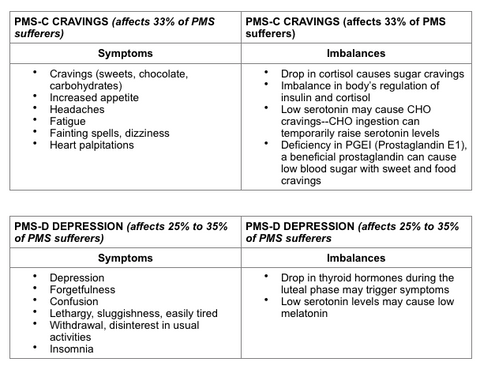Premenstrual Syndrome (PMS)
Premenstrual syndrome (PMS) is a common disorder in women of reproductive age that is characterized by the cyclic recurrence of physical, affective, and cognitive (or performance) symptoms.
The symptoms typically occur in the second half of the menstrual cycle, resolve after the period begins and are often absent during the early phase of the menstrual cycle. As many as 85% of menstruating women experience one or more symptoms of PMS. Approximately 5% to 10% of women have symptoms severe enough to be debilitating.
PMS affects women of all cultures and socioeconomic levels but types of symptoms and levels of discomfort vary from woman to woman and may have cultural influences. More than three hundred symptoms have been associated with PMS.
Among the most prominent and consistently described symptoms are depression, anxiety, irritability, craving for sweet or salty foods, headaches, weight gain, fluid retention, breast pain and swelling, abdominal bloating and acne flare-ups on the face and shoulders.
Some of the other commonly associated symptoms include:
- Abdominal bloating
- Abdominal cramping
- Accident proneness, coordination difficulties
- Acne, hives
- Aggression, rage
- Alcohol intolerance
- Anxiety, irritability, suicidal thoughts
- Asthma
- Back pain
- Breast swelling and pain
- Bruising
- Confusion
- Depression, withdrawal from others, emotional lability
- Edema
- Exacerbation of pre-existing conditions (e.g., lupus, arthritis, ulcers, herpes)
- Fatigue, lethargy
- Fainting (vasovagal syncope)
- Food binges, salt cravings, sweet cravings
- Headache, migraine
- Heart palpitations
- Insomnia
- Joint swelling and pain
- Nausea
- Seizures
- Sex drive changes
- Sinus problems
- Sore throat
- Urinary difficulties
1.The American College of Obstetricians and Gynecologists. ACOG News Release. Accessed April 5, 2004 from
http://www.acog.org/from_home/publications/press_releases/nr03-31-00-1.cfm.
2.Halbreich U. The etiology, biology, and evolving pathology of premenstrual syndromes.
Psychoneuroendocrinology 2003; 28(3 Suppl):S55-S99.
Causes of PMS
The exact cause of PMS is not fully understood and may be related to a number of factors. The current theories on the underlying causes focus mostly on levels of sex hormones (e.g., estrogen, progesterone) and neurotransmitters (i.e., brain chemicals that control mood), dietary influences and emotional factors.
Dietary Factors Influencing PMS
- Diets high in animal fats have been shown to increase prostaglandin (PGE2) production and aggravate PMS symptoms.
- Increased alcohol consumption during the premenstrual phase interferes with the liver’s ability to detoxify excess circulating hormones.
- Nutritional deficiencies such as calcium, magnesium, zinc, vitamin B6, vitamin E, and essential fatty acids contribute to PMS.
- Increased caffeine consumption causes an imbalance of cortisol and blood sugar and further inhibits the liver's ability to balance serotonin, estrogen, and progesterone, leading to breast tenderness and swelling.
Many factors can contribute to or trigger PMS by causing hormonal changes in the body, including:
- High consumption of dairy products
- Excessive consumption of caffeine (soft drinks, coffee, chocolate)
- Excessive consumption of high glycemic foods
- A relatively high blood level of estrogen
- A relatively low blood level of progesterone
- Diet that leads to increased levels of the hormone prostaglandin F2
- Excess body weight
- Low levels of vitamins C and E
- Magnesium and/or Selenium deficiency
- Lack of exercise
PMS has been divided into four categories according to specific sets of symptoms.



Top 5 Strategies for PMS
- Complete Hormone testing- Available through Dr Cobi @ Essential Health Natural Wellness Clinic- Contact Us for more information
- Liver detoxification
- Optimize nutrition through a whole food diet
- Eliminate sugar and caffeine
- Supplement with 5-HTP (100mg 1-3 times per day- do not combine with pharmaceutical anti-depressants), Evening Primrose Oil (3000mg per day for 4 weeks then 1000mg per day), Vitamin E (400-800IU per day), Vitamin B6 (50-100mg per day), Magnesium (150mg per day), Vitex (225mg per day) and DIM (125mg per day).
